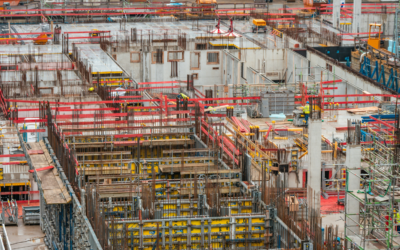Commercial architecture is the backbone of modern business infrastructure, shaping the spaces where we work, shop, dine, and socialize. From all types of commercial buildings, including office buildings to retail spaces, this field requires a unique balance of functionality, aesthetics, and sustainability.
For commercial property owners, real estate developers, and property developers, understanding the nuances of commercial architecture can unlock opportunities to create dynamic, engaging, and profitable commercial spaces. This guide explores the essentials of the field, offering insights into its key concepts, benefits, and best practices for any commercial and industrial projects.
What Is Commercial Architecture?
At its core, commercial architecture involves the design and construction of spaces specifically tailored for business use. This includes offices, retail spaces, hotels, restaurants, and industrial developments. Unlike residential projects, the goal of commercial design is to create functional spaces that not only serve specific business purposes but also leave a lasting visual impression.
Why Is Commercial Architecture Important?
Commercial architecture plays a vital role in a business’s success:
- Brand Identity: It establishes a visual identity that resonates with customers and stakeholders. A striking building design can leave a powerful impression and communicate professionalism.
- Customer Experience: Well-thought-out layouts and designs enhance the overall experience for customers, leading to increased foot traffic and loyalty.
- Sustainability: With an increasing emphasis on sustainable design, many commercial architects focus on reducing environmental impacts while creating healthier spaces for occupants.

The Role of a Commercial Architect
A commercial architect is a specialist trained to bring business visions to life through innovative design solutions. Their responsibilities extend far beyond drawing blueprints.
Key Responsibilities:
- Design Development: Architects work closely with business owners to understand operational requirements, creating designs that align with these goals.
- Knowledge of Regulations: From complying with safety codes to understanding zoning laws, architects ensure buildings meet all legal requirements.
- Material Selection: Architects select the most appropriate building materials for sustainability, cost-efficiency, and durability.
- Collaboration: They work closely with interior designers, contractors, and engineers to ensure that designs can be executed effectively.
By combining creativity, technical knowledge, and collaboration, a skilled commercial architect can transform a concept into a functional and aesthetically striking reality.
Types of Commercial Architecture
Commercial architecture encompasses a wide variety of projects. Here are the most common types:
Office Buildings
These range from small, single-business buildings to sprawling corporate campuses. Efficient layouts, energy efficiency, and employee comfort are key considerations.
Retail Spaces
Designed for shopping centers, boutiques, or standalone stores, commercial architects focus on customer accessibility, wayfinding, and visual appeal.
Hotels and Hospitality
Architects in this niche create immersive environments for living and leisure, focusing on guest experiences that align with brand values.
Mixed-Use Developments
Combining residential, office, and retail spaces, mixed-use projects cater to urban lifestyles and enhance the community’s livability.
By tailoring designs to fit specific business needs, commercial architecture transforms the urban landscape and drives economic growth.

Sustainable Design in Commercial Architecture
Modern commercial architecture is impossible to separate from sustainable development. Buildings account for nearly 40% of global energy-related carbon emissions, underscoring the need for eco-friendly practices.
Key Sustainable Practices:
- Energy Efficiency: Using smart systems such as energy-efficient HVAC (heating, ventilation, and air conditioning) and LED lighting to reduce resource consumption.
- Green Materials: Many commercial architects now prioritize materials like reclaimed wood, recycled steel, and low-VOC paint to reduce environmental impacts.
- Innovative Features: Green roofs, solar panels, and rainwater harvesting systems are common examples of cutting-edge sustainable design.
- Occupant Well-Being: Designs that improve indoor air quality and maximize natural light create healthier environments for productivity and satisfaction.
Sustainability isn’t just a trend; it’s a business-friendly approach that reduces long-term costs and aligns with growing consumer demand for responsible practices.
The Benefits of Architectural Design
The right architectural design can be a game-changer for businesses. Here’s how:
- Enhanced Brand Visibility: Unique designs draw attention and set businesses apart from competitors.
- Improved Customer Satisfaction: Thoughtful layouts and engaging interiors contribute to memorable and enjoyable experiences.
- Higher Productivity: Spaces optimized for employee comfort and collaboration lead to increased output.
- Positive Impact on Cityscapes: Commercial projects contribute to developing vibrant, inviting communities. Well-designed office buildings and retail spaces make cities more livable and attractive for residents and businesses alike.
Choosing the Right Architecture Firm
A successful commercial project begins with choosing the right partner. But what should you look for in architecture firms?
Key Factors to Consider:
Specialist Expertise:
- Ensure the firm has experience in commercial projects, particularly in the industry you’re operating in.
- Look for firms with a strong track record in interior design, landscape architecture, and sustainability.
Comprehensive Services:
- The best firms provide end-to-end solutions, from design development to project management.
Client Collaboration:
- A firm that values open communication and is flexible to your evolving needs is a valuable partner.

Trends and the Future of Commercial Architecture
The field of commercial architecture is rapidly evolving. Here are some trends shaping its future:
Technology Integration
From AI-powered design systems to smart building management, technology is streamlining processes and improving efficiency.
Social Responsibility
New designs prioritize accessibility, community engagement, and net-zero energy goals.
Hybrid Spaces
The rise of remote work has fueled demand for flexible layouts that accommodate both work and personal activities in single locations.
These trends demonstrate a shift toward more efficient, inclusive, and innovative designs that cater to the evolving needs of modern businesses.
Best Practices for Working with a Commercial Architect
To ensure your project runs smoothly, here are tips for collaborating with your architect:
- Define Your Goals Clearly: Be upfront about your vision for the space, functional requirements, and budget constraints.
- Be Open to New Ideas: Leverage your architect’s expertise, especially when it comes to proposing new materials or innovative design solutions.
- Communicate Regularly: Consistent updates eliminate misunderstandings during the construction process.
Collaboration is the backbone of a successful project, ensuring that the final product exceeds expectations.

Building for the Future
Commercial architecture isn’t just about buildings; it’s about creating spaces that serve people, businesses, and communities. From enhancing productivity to redefining urban areas, it’s a field that continues to push boundaries through thoughtful collaboration and bold ideas.
By working with skilled commercial architects and incorporating sustainable, people-centric principles, your business can create spaces that leave a lasting impact.
Want to design a space that stands out while meeting your business goals? Contact South Coast Improvement Company today to learn more about our award-winning design-build services and get started on your next project.
Learn More About Commercial Architecture
Commercial architecture is a dynamic and evolving field that combines functionality, aesthetics, and innovation to create spaces tailored to the diverse needs of businesses. To deepen your understanding of this industry, here are some reliable resources to explore:
- American Institute of Architects (AIA) – Learn about the latest trends and standards in architecture.
- ArchDaily – Discover inspiring commercial architecture projects from around the world.
- Green Building Council – Explore sustainable practices and certifications like LEED for commercial buildings.
- Dezeen – Stay updated with news and articles on cutting-edge commercial architecture.
- National Trust for Historic Preservation – Understand the significance of preserving and adapting historic commercial spaces.
- World Architecture Festival – Discover award-winning commercial architecture projects and innovative designs from global architects.
- Archinect – Browse through discussions, projects, and resources tailored for architecture professionals and enthusiasts.
- Architecture Digest – Explore inspiring commercial spaces and trends shaping modern architecture.
- Urban Land Institute – Learn about sustainable urban development and commercial real estate insights.
- Designboom – Stay updated on global architecture and design projects, including the latest innovations.
- Dezeen – Discover architecture and design news, interviews, and cutting-edge projects worldwide.
- World Architecture News – Get insights into architectural practices, competitions, and trends shaping the built environment.
- Architect Magazine – Access extensive resources and news tailored for professionals in the architectural field.
These resources can provide valuable insights and inspiration for your next commercial architecture project.
View Our Work
Aspen Dental
Partnering with The Aspen Group on the construction of a new Aspen Dental facility that’s functional & welcoming for patients & staff alike. South Coast Improvement Company was awarded the construction of a new Aspen Dental facility in Killingly, CT. The...
Springhouse Senior Living – HumanGood
Designed to enhance comfort & functionality. South Coast Improvement company was hired by HumanGood for an interior and exterior renovation at Springhouse Senior Living. Our skilled teamtransformed the 2nd through 5th floor common areas into brighter, more...






